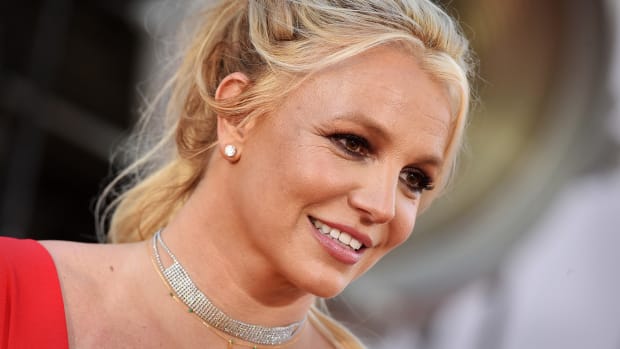Britney Spears is one of the biggest pop stars of the 21st century. She’s nowhere near the richest. Which at first glance, makes no sense.
Her 1999 debut album “...Baby One More Time “ in 1999 alone sold a staggering 25 million copies, making it the best-selling album by a teenage solo artist. Her Las Vegas residency “Britney: Piece of Me,” ran from 2013 and 2017, and that alone grossed $137.7 million. She has more than twenty different perfume lines and her own role-playing video game, “Britney Spears: American Dream.”
So why does Forbes estimate her personal wealth at “only” $60 million dollars? Well, a lot of people wanted a piece of Britney, and one person in particular spent years taking a big one.

Axelle/Bauer-Griffin/FilmMagic via Getty
Shouldn’t Britney Spears’ Be A Whole Lot Richer?
Obviously, $60 million is a ton of money.
But to put it in perspective, Rihanna has worked worked worked her way to an estimated $1.7 billion. Beyoncé has haloed herself an estimated $440 million. It’s not a wildest dream, Taylor Swift has an estimated $365 million. While Jennifer Lopez remains Jenny from the block, you might be fooled into thinking otherwise by her estimated $400 million.
And no disrespect or anything, but even Jessica Simpson is worth $200 million. (Even Jessica Simpson simply has to know she’s never made a song as good as “Toxic.”)
Years of sold-out Vegas residencies and several endorsement deals should, you'd think, get Spears' estimated net worth into the triple digits. Even "Blackout," Spears’ least commercially popular album, went platinum, and she has several diamond records to her name.
But unless you’ve not paid attention to the news at all or you live a blissful life free of social media (teach us your ways), you’ve likely heard that since 2008, Britney Spears has been living under conservatorship.
Many people first learned of that legal term when the #FreeBritney movement caught fire last year. It's when a court assigns a third person to manage the financial and everyday affairs of a person who has been incapacitated due to deteriorating physical or mental health. Under a conservatorship, people can’t make their own financial or business decisions, and often face several restrictions on their personal life choices.
Spears was assigned to a conservatorship in 2008 under her father Jamie Spears and lawyer Andrew M. Wallet, following public mental health struggles that culminated in shaving her head and attacking a paparazzi photographer, actions which are now largely understood to be the result of the singer’s postpartum depression.
After Spears spent years protesting the arrangement and an extensive fan campaign brought about media scrutiny into the conservatorship, culminating in the New York Times-produced documentary “Framing Britney,” a judge ended it late last year.
The Conservatorship Took A Piece Out Of Britney
Jamie Spears famously wasn’t around during Britney’s rise to fame, but he has often insisted that he helped his daughter recover from a low point in her career. He also compensated himself handily for his work.
Jamie Spears paid himself a salary of $16,000 per month, plus $2,000 for office expenses for his work overseeing his daughter’s career, according to The New York Times, and in 2014, “he was granted 1.5 percent of gross revenues from the performances and merchandising tied to her Las Vegas residency, ‘Piece of Me,’ which went on to earn a reported $138 million across nearly 250 shows.”
Jamie Spears stepped down as Britney’s conservator in August of last year; while the conditions of his departure weren’t made public, he was seeking $1.2 million dollars in attorney’s fees and his compensation, according to his lawyers.
We can only speculate about the mental strain and exhaustion Britney was operating under during her conservatorship, and if it contributed to her pairing down her work schedule. She told a court investigator in 2016 that she wanted the conservatorship ended as soon as possible, and that was “sick of being taken advantage of’ and she said she is the one working and earning her money but everyone around her is on her payroll,” according to the New York Times.
In that same year, she released "Glory," her last album to date. She ended her residency and stopped touring in 2018. At one time, she was the queen of commercial endorsements, taking part in campaigns for companies ranging from Pepsi (for which she earned $8 million) to Versace to Virgin mobile, but she hasn’t done a commercial since 2015.
But while she’s stopped working, the expenses have continued, from agent fees to to taxes to half a million a year in child support and alimony payments to her ex-husband Kevin Federline, plus the untold amount she spent in legal fees fighting the conservatorship. Over time, that’s all going to catch-up with her.
What Is Next for Britney?
One of the most heartbreaking revelations in Spears testimony against the conservatorship was that she had been denied her right to autonomy over her body, and was not allowed to have her intrauterine birth control device (commonly called an IUD), removed so she could have another child.
“This so-called team won’t let me go to the doctor to take it out, because they don’t want me to have any more children,” she told a Los Angeles judge, according to Rolling Stone.
Happily, Spears recently announced that she is pregnant with her first child with fiancé Sam Asghari. After what she's been through, if Spears chose to stay semi-retired and decided to enjoy her time with her new family and still considerable wealth, none could blame her.
But considering the clear public goodwill indicated by the #FreeBritney movement, if Spears wanted to do a soft reboot and begin performing and recording again, and recruited the right team of advisers, it’s hard to imagine that she couldn’t catch up with the rest of peers, if she so chose. But the nice thing is, now that’s a decision she gets to make.







